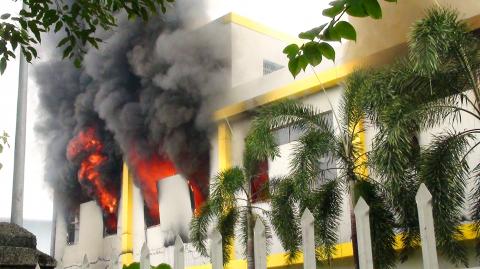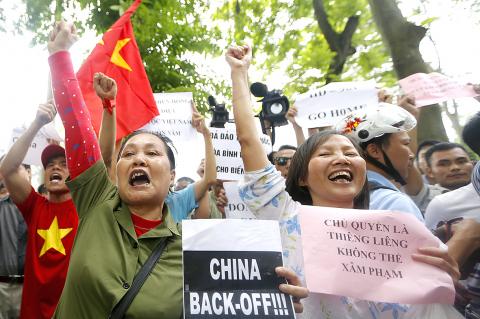Thousands of Vietnamese set fire to foreign factories and rampaged in industrial zones in the south of the country in an angry reaction to Chinese oil drilling in a part of the South China Sea claimed by Taiwan, Vietnam and China, officials said yesterday.
The brunt of Tuesday’s anti-China violence appears to have been borne by Taiwanese companies in the provinces of Binh Duong and Dong Nai that rioters mistook as being Chinese-owned.
The row over the South China Sea was sparked by Beijing’s movement of an oil rig near the Paracel Islands (Xisha Islands, 西沙群島) last week. The Paracels are claimed by Taipei, Hanoi and Beijing.

Photo: AFP
The anti-China violence in Vietnam has brought relations between Hanoi and Beijing to one of their lowest points since the Communist neighbors fought a brief border war in 1979.
“I fear a dark chapter in Sino-Vietnamese relations is now being written and because China wants to keep that oil rig in place into August, these protests could just be the first pages,” said Ian Storey, a expert on the South China Sea at Singapore’s Institute of Southeast Asian Studies.
Binh Duong People’s Committee vice chairman Tran Van Namb said the workers’ protests were initially peaceful, but disorder broke out when their numbers swelled to about 20,000. Gates were smashed and rioters set 15 factories on fire, he said.

Photo: EPA
“This caused billions of dong [hundreds of thousands of dollars] in damages and thousands of workers will have lost their jobs,” Nam said by telephone. “We urge everyone to stay calm, exercise restraint and have faith in the leadership of the [Vietnamese Communist] Party and State.”
A Binh Duong police official said by telephone that about 200 people had been arrested, adding: “We are working on other areas in the province... We haven’t seen any injuries.”
A Singaporean Ministry of Foreign Affairs spokesman said that the premises of a number of foreign companies in two Vietnam-Singapore joint venture industrial parks in Binh Duong had been broken into and set ablaze.
Chinese Ministry of Foreign Affairs spokeswoman Hua Chunying (華春瑩) told reporters that China was seriously concerned about the violence and had summoned Vietnam’s ambassador to protest.
Beijing has “demanded the Vietnamese side make efforts to adopt effective measures to resolutely support eliminating illegal criminal acts and protect the safety of Chinese citizens and institutions,” Hua told reporters.

AGING: As of last month, people aged 65 or older accounted for 20.06 percent of the total population and the number of couples who got married fell by 18,685 from 2024 Taiwan has surpassed South Korea as the country least willing to have children, with an annual crude birthrate of 4.62 per 1,000 people, Ministry of the Interior data showed yesterday. The nation was previously ranked the second-lowest country in terms of total fertility rate, or the average number of children a woman has in her lifetime. However, South Korea’s fertility rate began to recover from 2023, with total fertility rate rising from 0.72 and estimated to reach 0.82 to 0.85 by last year, and the crude birthrate projected at 6.7 per 1,000 people. Japan’s crude birthrate was projected to fall below six,

US President Donald Trump in an interview with the New York Times published on Thursday said that “it’s up to” Chinese President Xi Jinping (習近平) what China does on Taiwan, but that he would be “very unhappy” with a change in the “status quo.” “He [Xi] considers it to be a part of China, and that’s up to him what he’s going to be doing, but I’ve expressed to him that I would be very unhappy if he did that, and I don’t think he’ll do that. I hope he doesn’t do that,” Trump said. Trump made the comments in the context

SELF-DEFENSE: Tokyo has accelerated its spending goal and its defense minister said the nation needs to discuss whether it should develop nuclear-powered submarines China is ramping up objections to what it sees as Japan’s desire to acquire nuclear weapons, despite Tokyo’s longstanding renunciation of such arms, deepening another fissure in the two neighbors’ increasingly tense ties. In what appears to be a concerted effort, China’s foreign and defense ministries issued statements on Thursday condemning alleged remilitarism efforts by Tokyo. The remarks came as two of the country’s top think tanks jointly issued a 29-page report framing actions by “right-wing forces” in Japan as posing a “serious threat” to world peace. While that report did not define “right-wing forces,” the Chinese Ministry of Foreign Affairs was

PREPAREDNESS: Given the difficulty of importing ammunition during wartime, the Ministry of National Defense said it would prioritize ‘coproduction’ partnerships A newly formed unit of the Marine Corps tasked with land-based security operations has recently replaced its aging, domestically produced rifles with more advanced, US-made M4A1 rifles, a source said yesterday. The unnamed source familiar with the matter said the First Security Battalion of the Marine Corps’ Air Defense and Base Guard Group has replaced its older T65K2 rifles, which have been in service since the late 1980s, with the newly received M4A1s. The source did not say exactly when the upgrade took place or how many M4A1s were issued to the battalion. The confirmation came after Chinese-language media reported